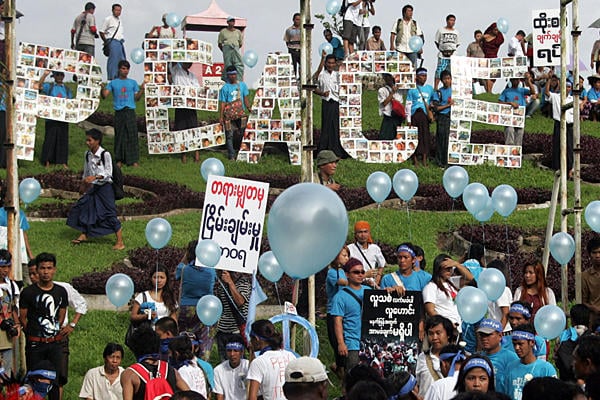
Thousands gathered in Yangon, Myanmar on Sept. 21, 2012 to commemorate the International Day of Peace and impel the government to end hostilities in the northern region of Kachin. Photo: Khin Maung Win/AP
When we last left Myanmar in May, former political prisoner Aung San Suu Kyi and her National League of Democracy supporters joined the country’s parliament, the government of President Thein Sein instituted some democratic forms, and there were high hopes that freedom was on its way. Yet the government waged a bitter guerilla war against Kachin rebels in the northern border region with China…
…Today, Aung San Suu Kyi continues to fight for her people. She is currently in the United States, where she has met with President Obama and Myanmar refugees. Thousands applauded and shed tears as she addressed one of the largest Myanmar communities in the U.S. in Fort Wayne, Indiana. She seemed sanguine that democracy is on its way, pointing out, “The important thing is to learn how to resolve problems. How to face them and how to find the right answers through discussion and debate.”
While the U.S. has lifted certain sanctions against Myanmar in response to Sein’s changes, Suu Kyi urged the lifting of the ban on imports which is still in force. Now that the country is opening up politically, she said, it must have the ability to develop economically from within. Sein is visiting New York this week for the UN General Assembly, the first time in over 40 years a Myanmar leader has traveled to the U.S.
But the Kachin struggle continues. Complicating matters are reports that the Chinese government has ordered refugees–who had fled the violence by crossing into China–to return to Myanmar.
These two storylines, Suu Kyi’s request to lift sanctions and the Kachin violence, are of course inextricably linked. The likelihood of the U.S. changing its stance of sanctions will and should depend on how Sein’s government handles the Kachin situation/brings it to a close, and how refugees are treated. With political reforms in place and seeming to be genuine, focus must now shift to eradicating ethnic conflict.
The right to life of all people regardless of ethnicity must be protected if any nation is to be considered a true democracy.